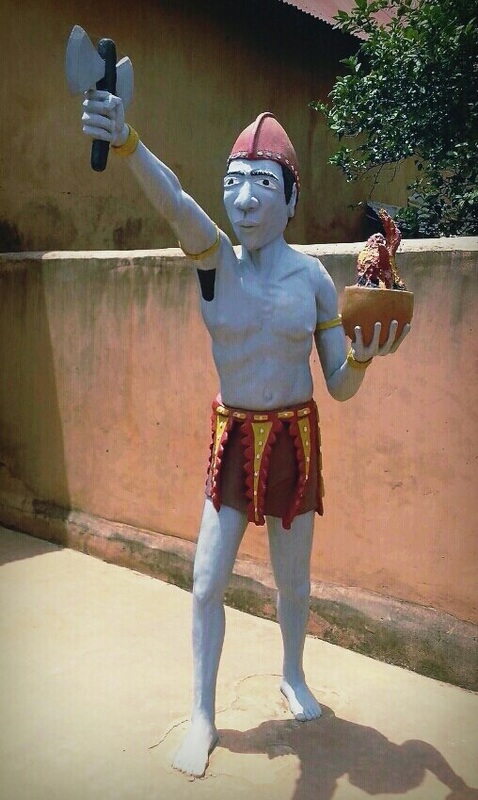|
Losso-Guda
| | | | | | | | | | | Shango and Elegba are intimate friends. Shango is very rich and has built a huge temple to keep its Vodussi (Vodussi are the ladies that are placed in Shango's temple during the initiation period ). But recently Shango can't find any Vodussi for his temple and hence the temple is empty. One day Legba asked him" My friend, you are rich and you have an empty temple. I have a deal in mind. What about buying for you many people that you can put in your temple. In return I will charge you for every person I get. Do you like my deal?" Shango replied" This is a good deal. For every person you bring me, I will give you money". And so they both agreed on the deal. On the market day Legba went to the market. Shango gave him a lot of money for buying people for him. Every body knew that Legba is a magician. Instead of buying people, he simple built statues (Vodissa) made of clay. And through magic, he could make the statues breath. Nobody had a doubt about the human nature of the statues, as they were breathing. Shango, very happy about the deal, was eagerly waiting for his friend Legba to return home with the promised merchandise. As he received the breathing statues, he was so excited that he did not notice that they were not real human beings. But on the way back home, it started to rain heavily and suddenly, all the statues began to dissolve. Shango couldn't believe what he was seeing. All Vodissas were dissolving. Boko Teko, Ivory Coast Temples are not built overnight. They are only as good as their devotees. Some people are like clay statues, which look so real, but quickly dissolve beneath the rain. Other people are like hats. They are fashionable but are blown away with the slightest gust of wind. Those who are sincere about building temples will need discernment, to identify high quality devotee. They will also need a reliable system by which to develop their congregation. Mostly, temple building requires patience to internalize and demonstrate the principles upon which the community will be organized. Live the medicine.
2 Comments
 We are all familiar with the prototypical images of spiritual leaders of Orisa Lifestyle, wearing traditional gowns, carrying icons and emblems of authority. Today, however, spiritual leadership manifests in people of many persuasions. The social worker, with tatoos from wrist to elbow, driving a black muscle car just might be a priest of Sango. The understated accountant, wearing glasses and a conservative dark pants suit might be wearing powerful Ifa charms on her body. The point is, you cannot tell a book by looking at the cover, so focus on spiritual development, not on how you or your shrine looks. The key word here is spiritual development, which is synonymous with growth and change. Remember, evolution is a function of adaptability, not strength. Stated differently spiritual leaders are most needed at those pivotal transition points, when people desperately need guidance and support. In my 20 years' experience as a human services professional, I have found that when it comes to providing spiritual leadership, what really matters is your ability to create enthusiasm, empower other people, instill confidence and inspire the people you serve to be the best they can be under ANY and ALL circumstances. If you've ever been on the front lines of a crisis situation, you know that can be a very tall order. Likewise, however, you might have also noticed that there are some things great spiritual leaders do every day. Check out these five keys for spiritual leadership and let me know what you think:
|
AuthorWrite something about yourself. No need to be fancy, just an overview. ArchivesCategories |

 RSS Feed
RSS Feed